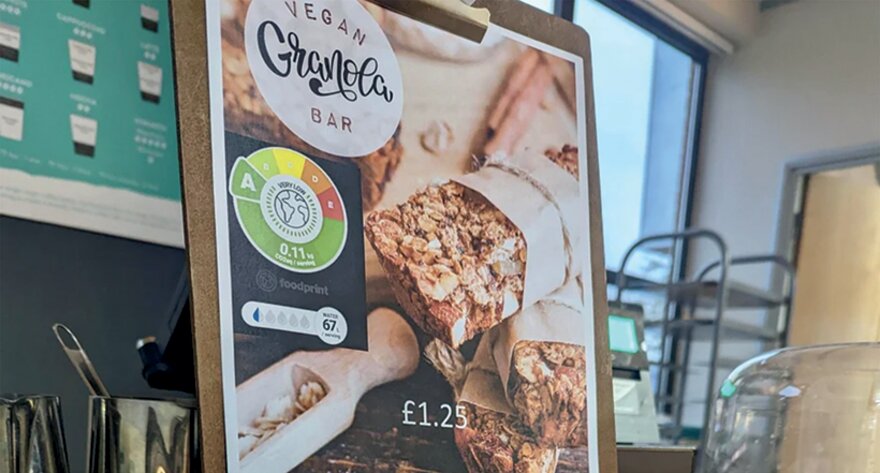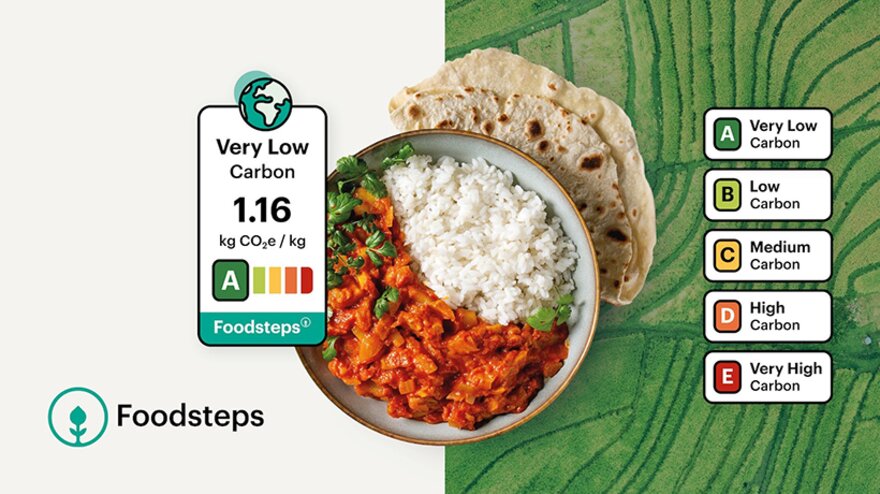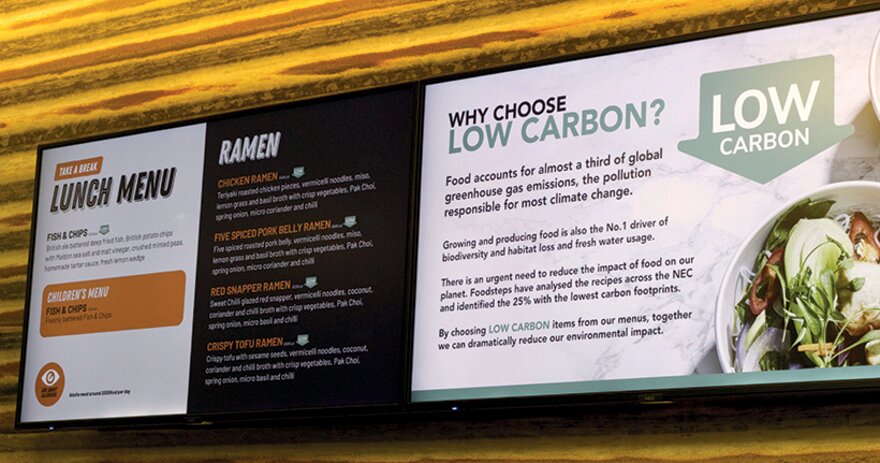Spotlight on: carbon labelling
When Wahaca dropped best-selling dishes from its menu as a result of its carbon footprint, it thrust the topic of carbon labelling into the limelight. It highlighted that measuring the environmental impact of dishes on a menu was not just being rolled out across businesses, but also communicated with consumers.
Research from the Compleat Food Group found that 73% of consumers feel it is important for food and drink to have a low carbon footprint, and that 18- to 34-year-olds are more likely to buy products with a lower carbon footprint. This suggests there is a strong driver for organisations to move towards carbon labelling, but such a move should not be undertaken in haste because it will involve partnering with a specialist in measuring carbon footprints and methodologies are still being developed.
Regardless of the challenges, there is an undeniable move towards hospitality companies committing to environmental and sustainable agendas and carbon labelling is becoming one of the components on the landscape.
WSH's Benugo with Foodprint by Nutritics
Helping both employees and consumers make more informed, sustainable choices has become a realistic achievement for contract catering company WSH since it implemented an environmental impact scoring system from Nutritics, across the bakery grab-and-go range of its Benugo estate.
Already committed to sustainably sourcing produce, the use of the Foodprint solution has not only enabled Benugo to gain greater visibility over the carbon footprint of its supply chain and identify areas for improvement, but it has also provided greater transparency to consumers.
Mike Hanson, director of sustainable business at WSH, says; "We wanted to reliably report on not only calories, allergens and nutritional content at ingredient and menu item level, but also on the environmental impact of each dish, from the field to the kitchen to the plate. Everyone – teams, consumers and management – is at a different stage in the ‘carbon literacy' journey, but by having an accurate and easy to understand scoring system we've been able to create balanced menus that offer more environmentally friendly dishes, and in turn help customers make greener choices by displaying carbon scores."
By inputting individual recipes, the software can generate an accurate carbon impact score for a specific dish or food item. Scores range from A to E, with A being the most environmentally friendly, and are displayed on the bakery and grab-and-go range.
Not only is this valuable in encouraging consumers to make more environmentally-friendly choices, but it also empowers WSH's chefs to create more sustainable menus and identify hotspots in the supply chain where efficiencies can be made. This has included swapping out a certain ingredient for a more sustainable, low-carbon alternative.
"It's an action that has been very well received by our customers and clients alike. Most importantly, it's given the tools to our chefs to make informed decisions about the food we serve, ensuring a balance of good food that does good," says Hanson.
Wahaca with Klimato
Wahaca does not expect any significant change in customers' selections following its introduction of carbon labelling, but it is an important part of the ethically conscious company's sustainability journey.
Mark Selby, co-founder of Wahaca, says the company had been looking into carbon labelling for some years and in April 2022 it chose to work with carbon management specialists Klimato after seeing its menu assessments at Cop 26 in Glasgow. Menu ingredients are given to the company, which then crunches the numbers and comes up with a carbon footprint for each dish in kilos.
Selby acknowledges the data is "not perfect" and Wahaca has chosen to rate its dishes by ‘low, medium and high', which is simple for its customers to understand and it enables it to overlay the findings with its own "steer". This means a side will be judged higher than a main course consisting of the same ingredients.
"It's not all about science, it's about the integrity in what you say," adds Selby.
This integrity has been played out in the decision by Wahaca to remove steak from its menus because its steak and cheese tacos proved to have a carbon footprint that was six times larger than that of its chicken tacos.
Selby highlights that the messaging to customers has to be "clear, clean, super simple and consistent". He also acknowledges that carbon labelling takes time and money and is therefore "not for everyone so don't rush in".
Just Eat with My Emissions
Just Eat has been working with a batch of restaurants on its platform to add carbon labelling to its menus. It is a move that it hopes will encourage other restaurants to follow suit and also drive diners to choose lower carbon footprint meals. The trial has involved restaurants in Brighton, including Smoque Burger, No Catch, Fat Pizza and Fat Burgers and Desserts that have been working with the carbon footprint specialist My Emissions.
Matthew Isaacs, co-founder of My Emissions, says it calculates the footprint of dishes by considering farming, manufacturing, packaging and transportation for each ingredient.
"We've 3,000 foods in our database, which we are building out through lots of legwork. This database is the starting point [for assessments] and it provides the average [carbon footprint] values for, say, UK tomatoes, but if a customer wants to drill down deeper then there will be extra costs. We'll also have to do this for more obscure ingredients," he says.
The Just East trial has involved assessing just the main menu items at the selected restaurants and the ratings are shown on its website – from A to E – but Isaacs says he has also been talking to participants about using labelling on their online menus. He hopes the work by Just Eat will prompt more restaurants to include greater numbers of lower carbon options on their menus.
Compass Groups' Eurest with Foodsteps
Following the completion of an eco-labelling pilot project with researchers in the Livestock, Environment and People labelling (LEAP) group at the University of Oxford, Compass Group UK & Ireland's business and industry sector is rolling out carbon labelling across its workplace catering sites.
Compass has been sharing its 90,000-strong recipe portfolio with the Foodsteps platform. This allows a carbon footprint to be calculated according to the ingredients, cooking methods and supply chain information, as well as an outlook on the menu as a whole. Eco-scores (ranked from A to E) are then displayed on customer-facing menus providing a visible tool to promote more climate-friendly choices.
Rees Bramwell, head of nutrition and sustainability for B&I at Compass Group UK & Ireland, says: "The A to E eco-scores have been met with unanimous appreciation among our clients, but importantly they have hugely influenced our operational teams, really transforming our culture to look at more sustainable options through data and insights."
Compass found that effective communication is important as customers want to understand what the scores mean, and so it therefore provided information at different points on the customer journey, such as in queues, on tables or digitally via screens.
The initiative is also affecting menu development, according to Ryan Holmes, culinary director at Eurest: "This year, we have successfully eliminated all E-labelled recipes in our restaurants and increased A-rated dishes by 25%, but it was by no means an easy feat. We also launched a robust engagement drive to explain to clients and consumers what eco-labelling means and why it is important."
Allmanhall and Epsom College
Food procurement company Allmanhall is helping a growing number of schools, including Epsom College, to drive their menus towards more sustainable and healthier options by measuring the carbon footprint of dishes and reflecting this on menus and posters.
Epsom College went live on the Foodsteps platform in July 2022, with initial training and support arranged by Allmanhall, and the catering team has so far gone on to add 1,000 recipes to the system.
Early assessments found the average carbon intensity of the recipes to be 5.21kg CO2e/kg, and almost a quarter of them had ‘very low' scores, with the lowest impact meal being carrot and coriander soup with a carbon intensity of just 0.13kg CO2e/kg.
The team has been working closely with Foodsteps to turn this information into posters – using a traffic light rating system of Very Low, Medium and Very High – that educates their pupils and makes the messaging around ‘farm to fork' very clear.
The assessments have led school kitchens including Epsom's to adapt their menus, according to Jo Hall, communications and development director at Allmanhall, who says: "The schools will say, let's reduce the proportion of red. They want to educate the children. By constantly reviewing the menus they can move from red to amber and green and promote specific ‘hero' dishes."
For Bev Spencer, director of catering at Epsom College, it has been a positive experience so far: "When people think about sustainability, often packaging and supply chains spring to mind, which of course is important, but we need to look at the food itself and this was a key reason why we chose to enter into this partnership with Allmanhall and Foodsteps."
Amadeus' NEC and ICC with Foodsteps
Amadeus is to expand its carbon labelling activity across all its venues after the early success it enjoyed at its NEC and ICC venues in Birmingham, where it has been working with solutions provider Foodsteps.
Foodsteps' cloud-based platform, labelling capability and QR codes can give a full lifecycle assessment of the recipes' carbon footprints from initial raw data. Those dishes that received a rating of ‘A' or ‘B' were given a custom ‘low carbon' food label alongside a short explanatory text on menus explaining to customers the meaning behind the label.
Ian Taylor, managing director for conventions and exhibitions at NEC Group, says: "We know from customer feedback that our visitors love the quality of food and service at both venues so we were excited that our carbon label trial would help them make more informed choices and reduce their carbon footprint."
The NEC venue used its digital screens to direct customers towards the sustainability information, allowing event-goers to easily check the impact of each dish.
Amadeus opted for simplified carbon labels as the project required a singular icon, legible in context at a high footfall event on digital screens, conforming to all accessibility requirements.
Continue reading
You need to be a premium member to view this. Subscribe from just 99p per week.
Already subscribed? Log In













